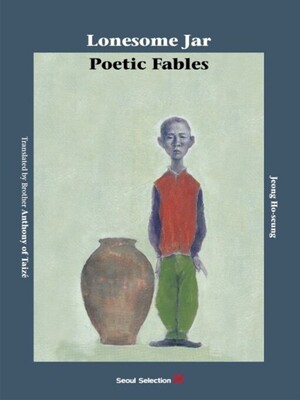
Sign up to save your library
With an OverDrive account, you can save your favorite libraries for at-a-glance information about availability. Find out more about OverDrive accounts.
Find this title in Libby, the library reading app by OverDrive.



Search for a digital library with this title
Title found at these libraries:
| Library Name | Distance |
|---|---|
| Loading... |
Jeong Ho-seung's Poetic Fables for Young Adults
Written by renowned lyric poet Jeong Ho-seung, whose writing touches on themes of loneliness, love, sadness, and joy, Lonesome Jar: Poetic Fables is now available in a newly published English edition. Originally published in Korean in 1998, the book has seen multiple reprints as it continued to comfort readers with its insight into loneliness, joy, and other deep-seated emotions. From the story of a seemingly paltry object finding purpose in life to a tale of momentary greed leading to an irrevocable decision, these fables offer fresh views on life, leading readers toward a rich treasure trove of wisdom.
Nuanced Translation and Soulful Illustrations
Lonesome Jar: Poetic Fables offers a delicately nuanced translation by Brother Anthony of Taizé (An Sonjae), Emeritus Professor at Sogang University. As the translator behind A Letter Not Sent (2016) and Though flowers fall I have never forgotten you (2016), Jeong's bilingual poetry collections previously published by Seoul Selection, Brother Anthony draws on decades of experience of translating Korean poetry for English-speaking readers around the world. Graced by Park Hangryul's illustrations, Lonesome Jar transports readers into its fables with poignant words and artwork.
Twenty Fables for Ordinary People Who Feel Discouraged
The title piece "A Hangari Jar" tells the story of the first jar made by a young potter. Unhappy with his first effort, the potter dumps the unsightly jar in his yard. The long-abandoned jar eventually finds use as a pisspot, but is forgotten once again as the potter dies and his kiln crumbles into ruin. The jar spends years in anguish, longing for meaning and value in life. Finally, it is discovered by the potter's son, who returns to his father's kiln as a monk. Building a temple and bell pavilion on the ruins, the monk awards the jar its long-awaited purpose—it is buried under the bell as a resonance chamber, giving the bell a clear, ringing tone. At long last, the once forlorn jar becomes "something precious for this world." Reminding readers that waiting is not in vain, the jar muses, "No matter whose life it is, if you go on waiting and trying . . . life's dream will come true."
The stories in Lonesome Jar: Poetic Fables follow the travails and triumphs of such objects and animals, presenting charmingly anthropomorphized fables. "Lovebirds" tells the story of a one-winged bird that can only fly after finding his other half; "Surprise Lilies" relates a tale of two cousins turned respectively into a flower and its leaves in punishment for their forbidden love; "The Seomjingang River" gives the account of a rebellious river that finally accepts its destiny of becoming the sea. The brief yet meaningful fables offer insight into the love, patience, and relationships of our human world; with compassion for life and its challenges, they whisper to readers that to live is to love and grow together. Lonesome Jar: Poetic Fables offers twenty such gems that demonstrate Jeong's broad and integrative worldview that spans both Buddhist and Christian traditions.







